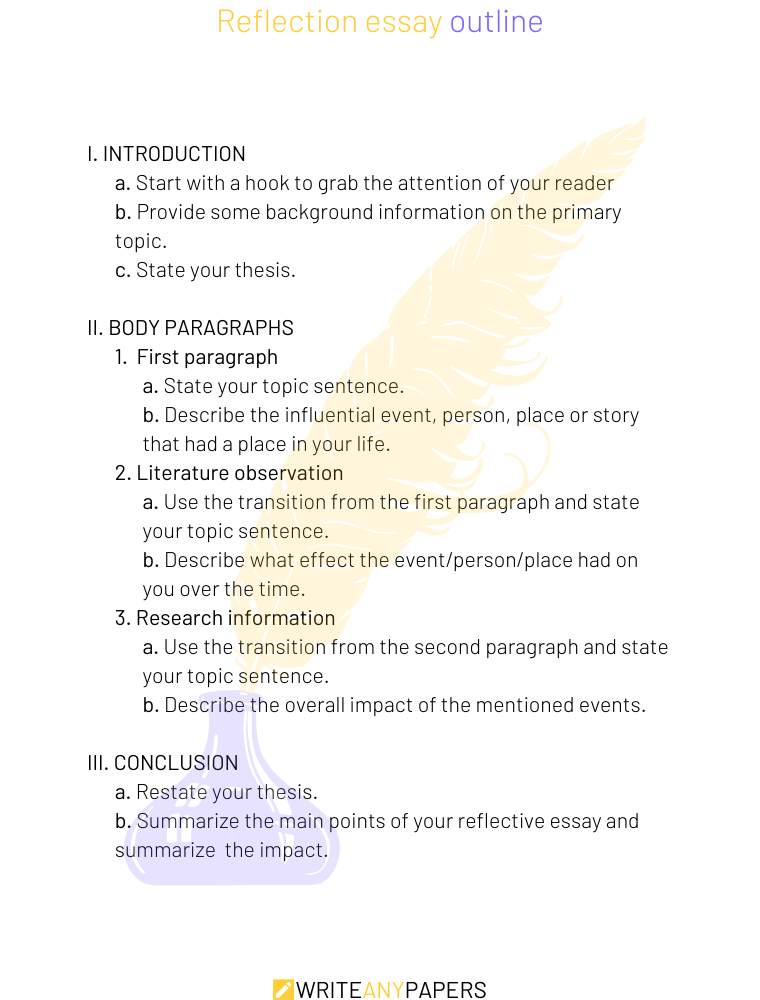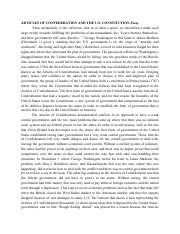
A reflective essay is a type of written work which reflects your own self. Since it’s about yourself, you already have a topic to write about. For reflective essay examples, readers expect you to evaluate a specific part of your life. To do this, you may reflect on emotions, memories, and feelings you’ve experienced at that time Reflecting on a personal experience might seem like an easy essay to write. However, to ace your reflection paper, dive deeply into your feelings and choose a topic that triggers a strong emotional response. If a reflective essay doesn't fit you, try exploring more about argumentative essays, including tips for making a compelling argument 11/29/ · On reflection, I would also have taken my positionality far more seriously, as I never imagined that the way I was perceived by others could affect my study. During my interviews with elite groups, they were often bemused and yet intrigued at the
Reflective Essay Examples
Last Updated: January 20, References Approved. This article was co-authored by Alicia Cook. Alicia Cook is a Professional Writer based in Newark, New Jersey, reflection essay.
With over 12 years of experience, reflection essay, Alicia specializes in poetry and uses her platform to advocate for families affected by addiction and to fight for breaking the stigma against addiction and mental illness. Alicia is a bestselling poet with Andrews McMeel Publishing and her work has been featured in numerous media outlets including the NY Post, CNN, reflection essay, USA Today, the Reflection essay, the LA Times, American Songwriter Magazine, and Bustle.
There are 9 references cited in this article, which can be found at the bottom of the page. wikiHow marks an article as reader-approved once it receives enough positive feedback.
This article has been viewed 3, times. Reflection papers allow you to communicate with your instructor about how a specific article, lesson, lecture, or experience shapes your understanding of reflection essay material, reflection essay. Reflection papers are personal and subjective [1] X Reflection essay sourcebut they must still maintain a somewhat reflection essay tone and must still be thoroughly and cohesively organized.
Here's what you need to know about writing an effective reflection. Support wikiHow by unlocking this staff-researched answer. To write a reflection paper, start with an introduction where you state any expectations you had for the reading, lesson, or experience you're reflecting on.
At the end of your intro, include a thesis statement that explains how your views have changed, reflection essay. In the body of your essay, explain the conclusions you reached after the reading, lesson, reflection essay, or experience and discuss how you arrived at them. Finally, finish your paper with a succinct conclusion that explains what you've learned.
To learn how to brainstorm for your paper, keep reading! Did this summary help you? Yes No. Log in Social login does not work in incognito and private browsers. Please log in with your username or email to continue, reflection essay. wikiHow Account. No account yet? Create an account. Community Dashboard Write an Article Request a New Article More Ideas Edit this Article.
Courses New Tech Help New Expert Videos About wikiHow Pro Upgrade Sign In. Home Random Browse Articles Courses New About wikiHow Easy Ways to Help Approve Questions Fix Spelling Quiz App More Things to Try We use cookies to make wikiHow great. By using our site, you agree to our cookie policy. Cookie Settings. wikiHow is where trusted research and expert knowledge reflection essay together.
Learn why people trust wikiHow. Categories Education and Communications College University and Postgraduate Academic Writing Essays How to Write a Reflection Paper. Download Article Explore this Article parts. Sample Outline and Paper. Related Articles. Article Summary. Co-authored by Alicia Cook Last Updated: January 20, References Approved. Sample Outline and Paper Sample Outline for Reflection Paper.
Sample Reflection Paper. Part 1 of Identify the main themes. Reflection essay sentences should be both descriptive yet straight to the point. Jot down material that stands out in your mind. Determine why that material stands out and make another note of what you figure out. For lectures or readings, you can write down specific quotations or summarize passages. For experiences, make a note of specific portions of your experience.
You reflection essay even write a small summary or story of an event that happened during the experience that stands out. Images, sounds, or other sensory portions of your experience work, as well. Remember, even though you'll need to explain what you read or experienced, a reflection paper should discuss your ideas about that, rather than just being a summary of it. Chart things out. In the first column, list the main points or key experiences.
These points can include anything that the author or speaker treated with importance as well as any specific details you found to be important. Divide each point into its own separate row. In the second column, list your personal response to the points you brought up in the first column.
Mention how your subjective values, experiences, and beliefs influence your response. In the third and last column, describe how much of your personal response to share in your reflection paper. Ask yourself questions to guide your response. If you are struggling to gauge your own feelings or pinpoint your own response, try asking yourself questions about the experience or reading and how it relates to you.
Sample questions might include: Does the reading, lecture, or experience challenge you socially, culturally, emotionally, or theologically? If so, where reflection essay how?
Why does it bother you or catch your attention? Has the reading, lecture, or experience changed your way of thinking? Did it conflict with beliefs you held previously, and what evidence did it provide you with in order to change your thought process on the topic?
Does the reading, lecture, or experience leave you reflection essay any questions? Were these questions ones you had previously or ones you developed only after finishing? Did the reflection essay, speaker, or those involved in the experience fail to address any important issues? Could a certain fact or idea have dramatically changed the impact or conclusion of the reading, lecture, or experience? How do the issues or ideas brought up in this reading, lecture, or experience mesh with past experiences or readings?
Do the ideas contradict or support each other? Part 2 of Keep it short and sweet. A typical reflection paper is between and words long. Verify whether or reflection essay your instructor specified a word count for the paper instead of merely following this average. If your instructor demands a word count outside of this range, meet your instructor's requirements.
Introduce your expectations, reflection essay. For a reading or lecture, indicate what you expected based on the title, abstract, reflection essay, or introduction. For an experience, indicate what you expected based on prior knowledge provided by similar experiences or information from others. Develop a thesis statement. At the end of your introduction, you should include a single sentence that quickly explains your transition from your expectations to your final conclusion.
A thesis provides focus and cohesion for your reflection paper. Explain your conclusions in the body. Your body paragraphs should explain the conclusions or understandings you reached by the end of the reading, lesson, or experience. You should provide details on how you arrived at those conclusions using logic and concrete details.
The focus of the paper is not a summary of the text, but you still need to draw concrete, specific details from the text or experience in order reflection essay provide context for your conclusions. Reflection essay a separate paragraph for each conclusion or idea you developed.
Each paragraph should have its own topic sentence. This topic sentence should clearly identify your major points, conclusions, or understandings. Conclude with a summary. Your conclusion should succinctly describe the overall lesson, feeling, or understanding you got as a result of the reading or experience.
The conclusions or understandings explained in your body paragraphs should support your overall conclusion. One or two may conflict, but the majority should support your final conclusion. Part 3 of Reveal information wisely. A reflection paper is somewhat personal in that it includes your subjective feelings reflection essay opinions. Instead of revealing everything about yourself, carefully ask yourself if something is appropriate before including it in your paper.
If you feel uncomfortable about a personal issue that affects the conclusions you reached, it is wisest not to include personal details about it.
If a certain issue is unavoidable but you feel uncomfortable revealing your personal experiences or feelings regarding reflection essay, write about the issue in more general terms, reflection essay.
How To Write A Reflective Essay (Definition, Topics, Outline) - EssayPro
, time: 4:29How to Write a Reflection Paper: 14 Steps (with Pictures)

5/19/ · What Is the Purpose of a Reflective Essay? Literary. This type of essay asks you to summarize and then respond to a piece of literature to understand it better and Professional. Teachers, doctors, and social workers often use this type of writing in their training. It helps employers Author: Virginia Kearney 1 day ago · How to begin a reflection paper example. Reflective Essay Introduction Example. Here is the introduction of the sample paper about the scariest situation which happened in the writer’s life. Examine which type of hook, the author uses. Try writing similar beginning about your frightening moment to practice this technique 3/19/ · Reflection papers allow you to communicate with your instructor about how a specific article, lesson, lecture, or experience shapes your understanding of class-related material. Reflection papers are personal and subjective, but they must still maintain a somewhat academic tone and must still be thoroughly and cohesively organized%(32)

No comments:
Post a Comment